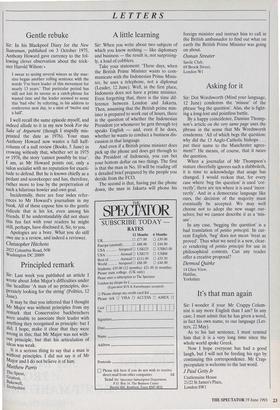Asking for it
Sir: Dot Wordsworth (Mind your language, 12 June) condemns the 'misuse' of the phrase 'beg the question'. Alas, she is fight- ing a long-lost and pointless battle.
By a happy coincidence, Damian Thomp- son's article on the very same page uses the phrase in the sense that Ms Wordsworth condemns: 'All of which begs the question: why did the 13 Anglo-Catholic bishops . . . put their name to the Manchester agree- ment?' He means, of course, that it raises the question.
When a journalist of Mr Thompson's stature cheerfully ignores such a shibboleth, it is time to acknowledge that usage has changed. I would reckon that, for every case where 'beg the question' is used 'cor- rectly', there are ten where it is used 'incor- rectly'. And in a democratic language like ours, the decision of the majority must eventually be accepted. We may well choose not to adopt the new usage our- selves; but we cannot describe it as a 'mis- use'.
In any case, 'begging the question' is a bad translation of petitio principii. In cur- rent English, 'beg' does not mean 'treat as proved'. Thus what we need is a new, clear- er rendering of petitio principii for use in philosophical contexts. Can any reader offer a creative proposal?
Dermod Quirke 14 Glen View,
Halifax, Yorkshire


















































 Previous page
Previous page